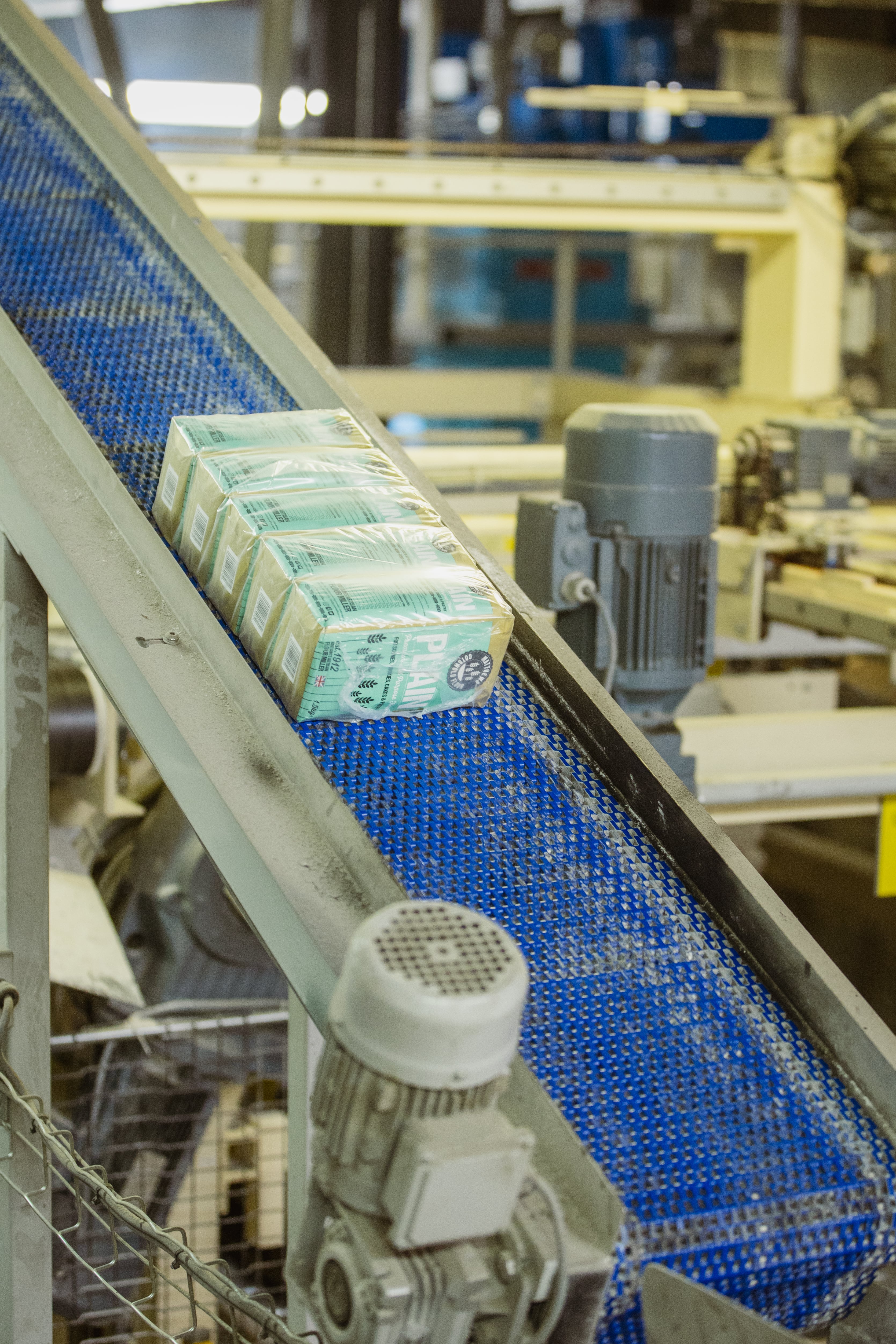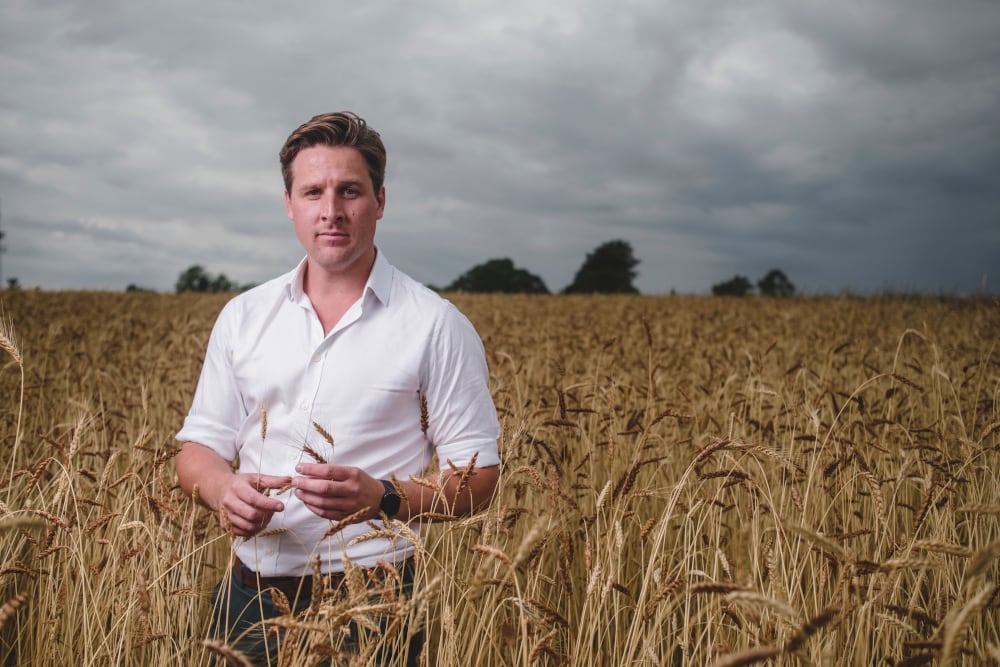Company address: FWP Matthews Ltd, Station Road, Shipton under Wychwood, Chipping Norton, Oxfordshire, OX7 6BH
Number of employees: Around 50
Size of site: Two acres of operational farmland surrounded by 14 acres of woodland
Shift patterns: Three shifts a day or four on/four off week
Types of lines: Produces British, French and Italian flours from conventional regenerative and organic farms and (top level) produces cake, pastry, plain self-raising, all-purpose, bread blends, specialty and wholegrain.
Capacity and output: Around 30,000 tonnes a year
Tangible assets (Company House report 2023): £2,656,625
The Matthews family have farmed and milled in the heart of the Cotswolds across three centuries. Matthews Cotswold Flour began with Marmaduke Matthews who set up a small business in the 1860s selling seeds from his barn in Fifield in Oxfordshire.
The family trade continued and in the 1900s Frederick ‘FWP’ Matthews (who the business is named after) made plans to expand the business with the construction of a roller mill. Roller milling uses steel rollers which move in different directions to grind the grain.
Prior to this, the milling had been done by stone – a technique still used today by some millers, including Matthews Cotswold Flour. As the name suggests, the grinding is performed with stones, creating more unique smell and flavour profile.
Construction of the Matthews Cotswold Flour roller mill started in 1910 and finished two years later.
Today, it’s FWP’s great, great, great, great grandson Bertie Matthews who is steering the ship, having taken officially over from his father, Frederick ‘Paul’ Matthews in 2020.
Paul has been involved in the business for 50 years, having joined the family trade in 1973.
Speaking about his father’s role, Bertie said: “He was instrumental in bringing back the provenance to the business. In the 50s and 60s, it was all about mass production and using merchants to buy your grain.”
Instead, Paul started working directly with farmers and named flours after local villages, towns and rivers to celebrate its locality.
The mill was also among the first in the country to mill organic flour, which it started in the late 1980s.
Bertie explains that as the baton has been passed on between each generation, a new developmental era has ensued. For Paul, it was the introduction of organic; and for Bertie, it’s been the roll-out of regenerative farming and the further strengthening of local produce – with 75% of its flour now sourced from local farmers within a 30-40-mile radius.
A 10% chance of survival
Whilst Bertie has made his own mark on the business, stepping into the helm hadn’t been the plan for Bertie initially. As the fifth of eight children, Bertie explained he had anticipated that one of his elder siblings would, at some point, take on the reigns of the family business.
In fact, although Bertie grew up next to the mill, he spent much of his late teens away from home, travelling and working abroad.
“I was off doing my own thing. I didn’t think I’d ever come back [home],” he told Food Manufacture.
But then in 2017, disaster struck. After more than 100 years of business, the specialist miller entered a creditors voluntary arrangement (CVA).
“We almost lost the business,” Bertie said, recalling how he came home to help his father, aged just 26.
“I didn’t really know a lot about milling or running a business, but we were in ‘site freefall’, we had to save the business.
“I asked the bank what percentage of businesses survive CVAs – they said 10%.”
The crisis was a result of several wrong financial decisions, according to Bertie.
“We didn’t have very tight financial control – i.e. an understanding of simple things like cash flows and monthly management accounts. It was done quarterly and then one quarter they missed it, so they were getting financial results very late. By that time, it was too late to take action.”
During this crisis period, everything had to be paid pro forma, with the business losing half its staff, half its customers, and half its fleet.
“It was a very challenging time. But that situation has led to a much stronger business today.”
For Bertie there is “no one definitive reason” for the business pulling through, but he did note that as it was his family’s business he “personally wasn’t going to give up”.
It helped, he noted, that he didn’t have anything to lose, knowing he was in a situation which allowed him to “take that risk”.
Alongside his personal motivations, Bertie’s economics background was a big strength, enabling him to gain “true financial visibility” over the business. But he also focused on putting the “right people in the right positions” and giving them complete clarity on the strategy, whilst “keeping a cool head” himself.

During the period of uncertainty, the business lost around half of its staff.
“I don’t hold anyone to account for deciding it wasn’t for them,” Bertie said. “They had to be motivated. We were fighting for survival.
“There’s probably only three out of about 70 people still here [from 2017] – the whole business has changed.”
Now, eight years on and the business is growing again.
“It was a long road, and we’re getting there,” he smiled, adding, “I certainly wouldn’t want to do that again.”
Finding your niche
Despite being a small mill, Matthews Cotswold boasts one of the largest ranges of speciality flours in the UK.
Whilst it’s tricky to manage multiple lines, Bertie explained that it is important to do something unique: “If you’re not a commodity flour mill, then you have to do something different. So for us, that’s being a specialist flour mill.”
Bertie defines ‘commodity millers’ as those who produce for the mass, making very few products, very quickly, and on low margins.
“[It’s] very difficult to make money [as a commodity mill], you have to be maximising your efficiencies. If your setup and your size makes it difficult to be able to maximise those efficiencies, then you have to specialise.
“And in order to be a specialist farmer, you have to do something a bit different. You have to be grinding different types of grains and developing different types of products that people can’t necessarily get from the mainstream.”
To facilitate this, Matthews Cotswold Flour has moved from its long production runs (of the same product) to a factory divided into three different production facilities.
“We’ve had to get new machines, [implement] different shift patterns, different team members to do all the mixing and blending to be able to facilitate this ridiculously large range that seems to keep growing.”
Bertie explained that while the demand for speciality flours is smaller, it is a growing category – especially for locally grown produce.
And while Matthews Cotswold Flour does import a few commodities, including Italian durum wheats and French flour to ensure it has a wide-ranging collection, the main bulk of the business is centred on local, regenerative farming.
Why regenerative farmed flour?
The move to regenerative was inspired by Ian Wilkinson, the founder of FarmED who resides in a neighbouring farm.
“Ian really introduced me to the challenges that farms are dealing with at the moment – a very high input system that’s really damaging to the soil and environment and how there is actually another solution,” Bertie said.
The term regenerative farming doesn’t have an official definition, but it’s generally regarded as a system that helps to rejuvenate the environment in which its grown.

“We talk about sustainability – sustaining the situation – this is about making it better,” Bertie added, as he stressed the importance of wanting to take care of the environment so it will allow his business – and the local farmers linked to it – to continue for another 100 years.
“If we continue to damage the soil and continue to damage the watercourses, then we’re not going to be able to do that, and we might have to import [more] in the future.”
The regenerative journey for Matthews Cotswold started in 2019 and with it followed the development of a set of standards which the business created off the back of talks with local farmers.
The process involves an audit, which is conducted by an independent party, and is focused on five objectives:
1. Improving soil fertility
2. Sequestering carbon
3. Improving biodiversity
4 Improving water infiltration and retention.
5. Ensuring that these farms are improving food security
“These are all measurable objectives and they’re measured during an audit every year,” Bertie continued.
“We’ve got six [certified regenerative] products that we’ve created under the Matthews brand. We also created six products for another brand called Wild Farms back in 2020 and now we’re now looking at expanding the range so 100% of our speciality flour can come from a regenerative system.”
For Bertie, it’s not just the right thing to do morally but it makes business sense too.
“It’s important that we’re securing our supply chain,” he said. “We want to be here in another 100 years.”

